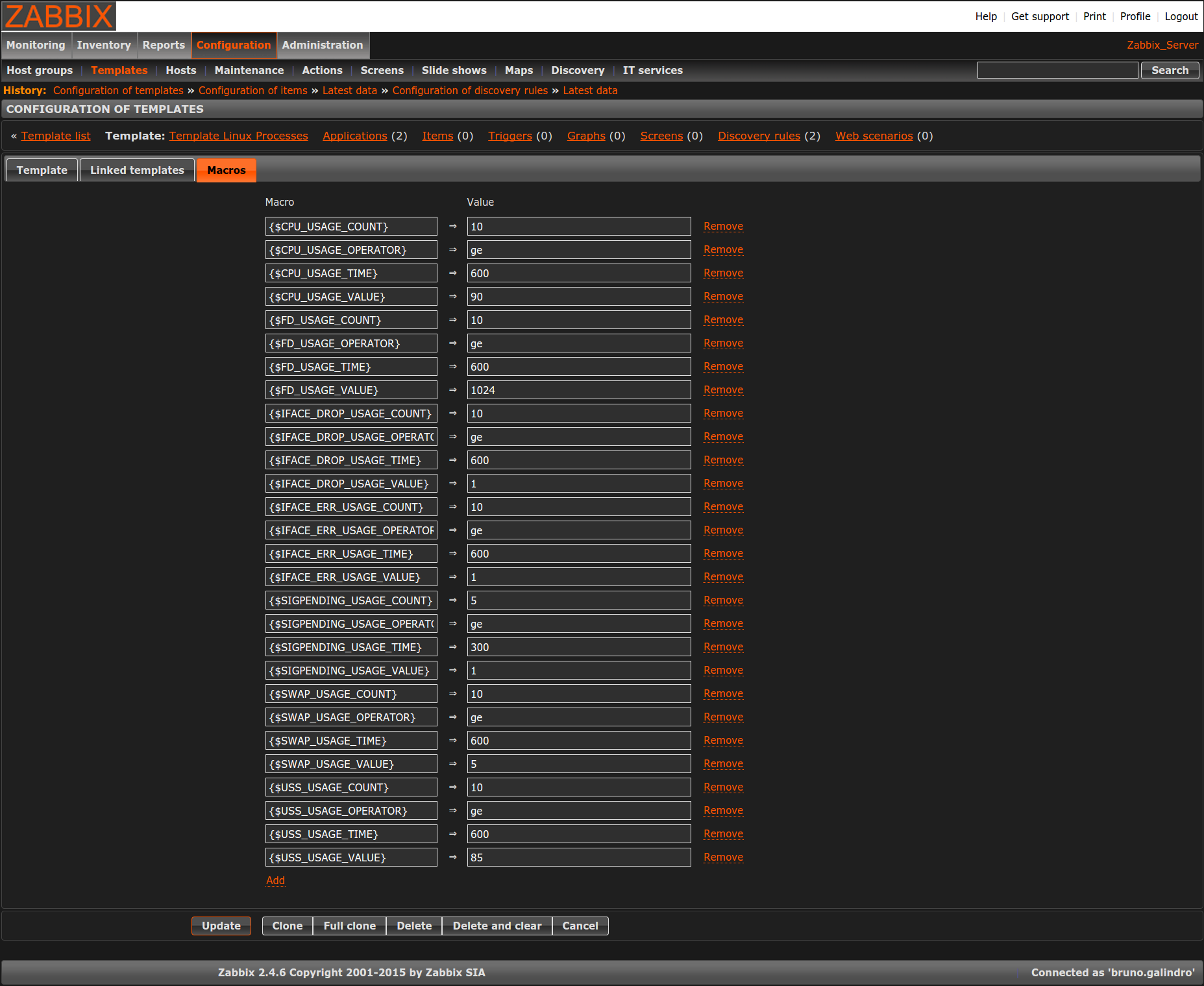Enhanced templates for Zabbix server. These templates adds new items and triggers for deep OS monitoring.
This template get the results of ulimit command.
This template was built using [vm.memory.size] (https://www.zabbix.com/documentation/2.4/manual/appendix/items/vm.memory.size_params) function and all of its parameters.
This template uses [get_proc_stats.sh script] (https://github.com/galindro/zabbix-enhanced-templates/blob/master/scripts/get_proc_stats.sh) to search the PID of a given process or processes by using LLD discovery. For discovery, the script will need as first parameter, a JSON string and, as second parameter, the string discovery. There is another parameter called net_discovery that is used by Get processes with PID with network interfaces discovery rule. This feature builds the LLD json with OS network interfaces for processes network statistics.
# Script help:
Usage:
For discovery: ./get_proc_stats.sh <json> discovery or ./get_proc_stats.sh <json> net_discovery
* Example #1: Discover process pids with exactly names "trivial-rewrite" and "qmgr" that are owned by postfix and discover process pids with "zabbix" on its name and "/usr/bin" regexp on its entire command line -> ./get_proc_stats.sh '{"postfix":{"exactly":["trivial-rewrite","qmgr"]},"root":{"name":["zabbix","ssh"],"cmd":["/usr/bin"]}}' discovery
* Example #2: ./get_proc_stats.sh '{"postfix":{"exactly":["trivial-rewrite","qmgr"]},"root":{"name":["zabbix","ssh"],"cmd":["/bin/sh"]}}' discovery
For counters: ./get_proc_stats.sh <pid> <options>
* Example #1: Retreive process file descritors quantity -> ./get_proc_stats.sh 928 fd
* Example #2: Retreive process state -> ./get_proc_stats.sh 928 stateThe script uses smem to get processes detailed memory usage and jq for build and parse json data.
To get PID from processes, it uses pgrep. So, the script will execute pgrep acording to the informed keys on json parameter of discovery/net_discovery process:
"name" key will use execute this pgrep command:
pgrep <string_defined_in_json> -u <user_defined_in_json> -l"cmd" key will use execute this pgrep command:
pgrep -f <string_defined_in_json> -u <user_defined_in_json> -l"exactly" key will use execute this pgrep command:
pgrep -x <string_defined_in_json> -u <user_defined_in_json> -lThe triggers associated with the template are configurable via user MACROS. The default values are set in the template, but they can be changed per host. This is the list of MACROS:
This template is intended to show common vulnerabilities found in some Linux packages and libraries.
Use this template to monitor linux ntpd deamon. This template uses the following scripts and userparameter files:
- ntp_discovery.sh: used to discover the ntp peers
- ntp_erros.sh: used to calculate the number of reachability errors. It is a customized version of ntp_packets.sh
- userparameter_ntp.conf: used by zabbix agent
The scripts must be placed in /etc/zabbix/scripts. If you want to change the destiny, you will need to changed the userparameter_ntp.conf file to reflect the new path.
- Import the required value mappings into database
mysql -h $MYSQL_HOST -u $MYSQL_USER -p $MYSQL_DATABASE < sql/value-mappings*.sql-
Disable vm.memory.* items from any template that is used by hosts that you are planning to associate the Template Linux Memory to avoid duplicated key problem
-
Import the templates through Zabbix web interface
- Run this script on each monitored host:
apt-get update && apt-get -y install smem jq
mkdir -p /etc/zabbix/scripts/
cd /etc/zabbix/scripts/
wget https://raw.githubusercontent.com/galindro/zabbix-enhanced-templates/master/scripts/get_proc_stats.sh
chmod 0700 get_proc_stats.sh- Add it to the host
- Create a user macro called {$PROCS_TO_SEARCH} with the required JSON for processes search
- Wait for discovery process to find the PIDs
This software was tested on these envirionments:
- Ubuntu 14.04
- Zabbix 2.4.6
- Ubuntu 14.04 and Ubuntu 12.04
- Zabbix agent 2.2.10 and 2.2.8
GNU GENERAL PUBLIC LICENSE Version 2, June 1991
